Politics
Kurtulmuş urges political, social unity for new Turkish constitution
Parliament Speaker Numan Kurtulmuş on Thursday called for political and social unity in Türkiye for a new constitution.
“A brand-new civilian constitution is a crucial matter for Türkiye, and it is above parties or politics. It’s a national contract,” Kurtulmuş said at the “Türkiye’s Civil Constitutional Journey Project” event in the capital of Ankara.
Kurtulmuş pointed out that the 1982 Constitution has been subject to debate since its implementation.
“One of the most important issues of a strong Türkiye is social unity, togetherness, integration and state-nation fusion,” Kurtulmuş said and added, “There is no doubt that one of the basic elements of standing strong is a new constitution, and that there is a need for a new constitution.”
It’s vital to present a brand-new social contract that can meet the requirements of the age and demands of the people, he argued.
Constitutional reform cannot be the sole concern of any political party or political figure; it’s a common concern of 86 million people of Türkiye, Kurtulmuş said. “Therefore, we must proceed with great care without turning this into an area of political calculations.”
The government has been pushing to overhaul the Constitution for over a decade now, which was enforced in 1982 following a military coup that led to the detention of hundreds of thousands of people along with mass trials, torture and executions, which still represents a dark period in Turkish political history.
The ruling Justice and Development Party (AK Party) has a comprehensive draft prepared by a scientific council during the pandemic, which it hopes to submit to Parliament.
Last summer, Kurtulmuş oversaw talks between political parties on a constitutional overhaul and met representatives of all parties at Parliament to discuss a new constitution. He has said the general consensus was “positive” but that the main opposition Republican People’s Party (CHP) “still remains far from the table.”
The CHP is inclined to reject a constitutional overhaul, with its leader, Özgür Özel, claiming such a change has raised “other kinds of negotiations” without elaborating.
At least 400 lawmakers must ratify a new constitution draft in Parliament. Anything over 360 votes would allow a referendum, allowing the people to decide.
Politics
Parliament under spotlight in new phase of ‘terror-free Türkiye’
The Turkish Parliament delayed its summer recess on Wednesday while lawmakers from a party linked to the PKK terrorist group met the parliament speaker on Thursday with the agenda of the “terror-free Türkiye” initiative. Developments point out that Parliament will likely establish a committee on advancing the initiative that aims to end a campaign of violence plaguing Türkiye since the 1980s.
Parliament Speaker Numan Kurtulmuş met lawmakers Pervin Buldan and Mithat Sancar from the Peoples’ Equality and Democracy Party (DEM Party), which seeks the formation of a parliamentary committee exclusively to tackle the initiative. The initiative was launched by Devlet Bahçeli, head of the Nationalist Movement Party (MHP), last year. The DEM Party acted as “messenger” between the PKK’s jailed ringleader Abdullah Öcalan and Turkish politicians and the public in general after Öcalan agreed to Bahçeli’s proposal to call on the PKK to lay down arms. The terrorist group in May announced that it would dissolve itself, though its next steps remain unclear. Turkish authorities have confirmed that the group’s disarmament would take place in Iraq and Syria, and Turkish intelligence would coordinate the handover of weapons.
Speaking after their meeting with Kurtulmuş, Buldan told reporters that they discussed the current stage of the initiative, describing it as a “positive meeting.” Buldan said they were also planning to hold talks with Bahçeli, President Recep Tayyip Erdoğan and main opposition Republican People’s Party (CHP) leader Özgür Özel in the coming days to discuss a terror-free Türkiye. Sancar said Parliament would play a crucial role in the initiative. The DEM Party pursues greater transparency in the initiative, while the government favors a cautious approach, as earlier attempts to dissolve the PKK without a strictly military approach have failed. The DEM Party, which has intricate links with the terrorist group, also aims to ensure accountability for the initiative, which was mostly based on informal steps so far, as the terrorist group, naturally, is not recognized as “a party” to an agreement, in accordance with Türkiye’s refusal to negotiate with terrorist groups.
Politics
Erdoğan, Qatari emir discuss Türkiye-Qatar ties, regional issues
President Recep Tayyip Erdoğan held a phone call with Qatari Emir Sheikh Tamim bin Hamad Al Thani on Thursday, during which the two leaders discussed bilateral relations as well as regional and global developments, according to a statement from the Turkish presidency.
Erdoğan informed Al Thani that he held talks with counterparts at the NATO summit regarding the military escalation between Iran and Israel.
The leaders also reviewed the state of Türkiye-Qatar relations and ongoing diplomatic efforts amid rising tensions in the Middle East.
Ankara and Doha enjoy strong relations, particularly since the 2017 blockade of the Gulf country by Saudi Arabia and others. The two countries have strengthened military and economic ties in recent years.
Politics
Türkiye supports NATO’s 5% defense budget goal
Türkiye backs NATO’s decision to more than quadruple its defense spending target to 5% of GDP by 2035 and is already surpassing the previous standard of 2%, according to a Turkish Defense Ministry source on Thursday.
NATO allies on Wednesday agreed to raise their collective spending goal to 5% of gross domestic product over the next decade, citing the long-term threat posed by Russia and the need to strengthen civil and military resilience.
“Türkiye is above the 2% target criterion under the Defence Spending Pledge,” the source said. “As NATO’s second-largest army, Türkiye is among the top five contributors to the alliance’s operations and missions.”
The source said Türkiye had fulfilled all its NATO capability targets and was continuing to invest in defense industry development and research. It plans to expand a layered air defense network across the country, centered around its national “Steel Dome” project.
“We are investing in air defense systems, hypersonic, ballistic and cruise missile capabilities, unmanned land, sea and air systems, as well as next-generation aircraft carriers, frigates and tanks,” the source said.
The new NATO target includes at least 3.5% of GDP for core defense spending, with the remainder to be spent on security-related infrastructure to improve civil preparedness and resilience.
It’s a major revamp of the way NATO calculates defense spending. Until now, the allies had set a target of 2% of gross domestic product for their defense budgets.
They’ll now be able to include weapons and ammunition they supply to Ukraine in the equation, making the new target slightly easier to reach, but still difficult for Canada and a number of European countries with economic troubles.
On top of that, the allies will dedicate 1.5% of their GDP to upgrading infrastructure – roads, bridges, ports and airfields – needed to deploy armies to the front. Money spent on protecting networks or preparing societies for future conflict can be included.
Progress will be reviewed in 2029, after the next U.S. presidential election.
Not everyone is on board. Spain officially refused the agreement. Slovakia had reservations. Belgium, France and Italy will struggle to meet the new target.
The leaders reaffirmed their “ironclad commitment” to NATO’s collective defense clause, Article 5. In recent years, U.S. President Donald Trump had sown seeds of doubt about whether the U.S. – NATO’s most powerful member – would come to the aid of any ally under attack.
Trump had appeared to condition that support on higher defense spending. With NATO’s new spending pledge in the bag, he told reporters that “I left there saying that these people really love their countries. It’s not a ripoff. And we’re here to help them protect their country.”
He added that “they want to protect their country, and they need the United States, and without the United States, it’s not going to be the same.”
Anti-Daesh coalition
The Turkish ministry sources also confirmed regional nations would form an alliance against the Daesh terrorist group, which carried out a suicide attack that killed 25 people at a Damascus church on Sunday.
Türkiye condemns the attack, which targets Syria’s social peace and unity and is a crime against humanity, the sources added.
They urged Syrian people to unite against “assaults and provocations of enemies.”.
Sunday’s attack on Mar Elias Church marked the first of its kind in Syria in years, as the capital seeks to stabilize and restore normalcy amid lingering conflict and divisions following the ouster of Bashar Assad in December.
“Türkiye has already sent military personnel to Syria that will serve in the anti-Daesh operation center,” the sources said. “A structure will be established where regional countries can jointly fight against Daesh. We will continue to cooperate with all our might to end the scourge of terrorism in Syria, as we do Türkiye.”
The sources said Türkiye would provide the Syrian government with the necessary support to fight against terrorism.
Earlier this year, Ankara confirmed a four-way coalition with Iraq, Jordan and Syria against Daesh was underway, which will include intelligence sharing and joint operations.
Daesh took over vast swathes of Syria and Iraq in 2014, but it lost its grip on the territory after campaigns by U.S.-backed forces in Syria and Iraq and Syrian forces backed by Iran, Russia and various paramilitaries.
A U.S.-led coalition force still raids Daesh cells in Syria. In addition, the U.S., under the pretext of this “fight” against Daesh, supplies military equipment and training to the PKK/YPG, a terrorist group holed out in northeastern Syria, despite protests by Türkiye, which both terrorist groups target.
As part of a “terror-free” initiative launched last year, the PKK, a designated terrorist group by Türkiye, the U.S., the U.K. and the EU, announced the historic decision last month to disarm and end its decades-long terror campaign that killed at least 40,000 people.
When asked about the status of the PKK’s dissolution, the ministry sources said the relevant Turkish authorities were monitoring the process “with great care.”
“The Turkish Armed Forces (TSK) continue to make every effort to successfully complete the process by taking the necessary measures without compromising the security of our country,” they noted.
Politics
Kılıçdaroğlu may return as chair of Turkish main opposition: Report
“This is Kemal, I am coming,” was the famed slogan of Kemal Kılıçdaroğlu when he took on President Recep Tayyip Erdoğan in the 2023 presidential elections. The former chair of the main opposition Republican People’s Party (CHP) apparently eyes another comeback. Days before a critical trial where his successor, Özgür Özel, is accused of buying votes to win over Kılıçdaroğlu in a 2023 intraparty election, the veteran politician met Özel’s “messengers.”
Three prominent figures of the party recently met Kılıçdaroğlu, according to the media reports, seeking to persuade him to publicly announce his opposition to a likely verdict in the trial that may conclude with “absolute nullification” of the party convention in November 2023 that brought Özel to power in Türkiye’s oldest party. However, Kılıçdaroğlu opposed the idea, journalists close to the CHP claimed, citing that the process may end with the appointment of trustees to run the CHP. He reportedly told Özel’s messengers, including Ankara and Mersin Mayors Mansur Yavaş and Vahap Seçer, and CHP party assembly member Engin Özkoç that he would not allow trustees to run the party, implying he may take over chairpersonship.
Özel, who spoke to the Birgün newspaper on Wednesday, said his colleagues had good intentions in contacting Kılıçdaroğlu but added that he was not worried about the trial. Özel underlined that even if the court rules for the absolute nullification of his 2023 election, he would not back down. “Nobody should expect us to abandon what people entrusted to us. We will do what we did in Saraçhane since March 19 and stand up for the party,” he said. Since that date, in which the party’s Istanbul Mayor Ekrem Imamoğlu was arrested on corruption charges, the CHP has been holding rallies both in Saraçhane, where the Istanbul municipality building is located, and across Türkiye, to voice its opposition to the arrest. The protests evolved into all-out riots and a controversial boycott call. Özel said, “Some people were trying to dig up the past,” and the CHP should “not fall for it.”
An “absolute nullification” verdict at the next hearing of the trial on June 30 may render all decisions regarding the party signed by Özel invalid and thus, his reelection in an extraordinary vote CHP recently held may be invalid as well. This will force him to hand over his seat to his predecessor.
Kılıçdaroğlu faced a bitter end as chair of the CHP when he lost to Erdoğan in the 2023 elections, although he mostly succeeded in uniting other opposition parties against the incumbent president. His defeat in the run-up gave rise to intraparty dissent and eventually led to the November 2023 election in the party.
Prosecutors are seeking up to three-year prison sentences for a total of 12 suspects, including Istanbul’s ousted mayor, in the ongoing trial against the CHP over alleged vote buying in its 2023 election.
Imamoğlu and 11 others, including CHP’s Izmir Mayor Cemil Tugay, are charged with “rigging votes” in the election, the Chief Public Prosecutor’s Office in the capital Ankara said earlier this month after completing its investigation into allegations of corruption in the CHP.
Other CHP figures facing a prison sentence and a ban on politics for the duration of their sentence include the CHP’s former mayor of Istanbul’s Beşiktaş district, Rıza Akpolat, Bursa’s Osmangazi district Mayor Erkan Aydın, as well as several district mayors in Istanbul. Akpolat was suspended from duty by the Interior Ministry back in January as part of the investigation, which was launched following a lawsuit filed by a former CHP mayor and several other delegates late last year.
The lawsuit seeks to cancel the party’s 38th Ordinary Congress that included the election and asks to suspend all CHP officials linked to the congress. If the court rules to annul the congress that elected Özel as CHP chair, a trustee would be assigned to administer the party, who would then call for an extraordinary congress within 45 days.
The CHP, in its response to the court last month, requested the case’s dismissal, citing the provisions of the legislation that the annulment of a decision taken at the congress could be requested within a maximum of three months from the date of the decision.
Several eyewitnesses testified in court about the allegations that delegates were made to vote in exchange for money at the said congress.
Ankara prosecutors have said the bribery claims are based on the legal complaints of CHP delegates who told investigators that they were offered bribes ranging from cash and houses to prominent jobs in municipalities the party runs.
Prosecutors took the testimonies of some 86 people, including Imamoğlu, who is under arrest and suspended from duty.
Imamoğlu is also accused of orchestrating the scheme to sway at least 150 delegates against Kılıçdaroğlu.
In the first round of the election, Özel received 682 votes and Kılıçdaroğlu 664; since neither candidate received the support of a simple majority (684) based on the total number of delegates, a rerun was held. In the special second round, Özel was elected as the eighth chair of the CHP with 812 votes against Kılıçdaroğlu, who received 536 votes..
Politics
Türkiye looms large as NATO agrees on stronger defense
The NATO summit in the Netherlands’ The Hague was set to conclude on Wednesday with a pledge on increasing defense budgets of the top security alliance as conflicts rage on across the world. From the U.S. president to Ukraine’s leader, heads of state and government streamed into the meeting held under the shadow of the Russia-Ukraine conflict and tension between Iran and Israel.
President Recep Tayyip Erdoğan was among the leaders under the spotlight at the summit and stood next to U.S. President Donald Trump during a photo shoot at the summit, while the two leaders shared the same table at a dinner on Tuesday hosted by Dutch royalty. Commanders-in-chief of NATO’s two biggest armies also held a bilateral meeting on Tuesday. Türkiye will host the next summit of NATO heads of state and government in 2026, as reaffirmed in the declaration of the summit.
Erdoğan also held bilateral talks on Wednesday on the sidelines of the summit, including with British Prime Minister Keir Starmer and German Chancellor Friedrich Merz.
Speaking to reporters in Ankara on Tuesday before leaving for the summit, Erdoğan said his country strongly supported fair burden-sharing and the strengthening of European security, adding that Türkiye operates NATO’s second-largest land army and contributes significantly to the alliance’s deterrent power.
He criticized trade restrictions among NATO members in the defense sector, saying such barriers must be removed immediately. “As we set out with the goal of a stronger defense and a more effective military, we do not find it right to raise obstacles to trade in defense products between allies. These obstacles and restrictions should be removed as soon as possible, without ifs or buts.”
“In this context, we closely follow the recent initiatives of the European Union in the field of defense and security. Our country, which contributes more to Europe’s security than many of its members combined, should be properly included in the union’s defense initiatives. The inclusion of the Turkish defense sector in the union’s defense mechanisms and projects will benefit all of Europe. We are in close consultation with our non-EU allies on this,” he added.
During their meeting, Erdoğan and Trump underscored the importance of strengthening NATO’s deterrence as two of the alliance’s leading members. Welcoming the recently brokered cease-fire between Israel and Iran, Erdoğan praised Trump’s efforts in facilitating the truce and expressed hope that it would be sustained. He underscored the urgent need to end the humanitarian crisis in Gaza and reaffirmed Türkiye’s readiness to engage in close dialogue for peaceful solutions to the ongoing conflict in Ukraine. During the meeting, Erdoğan also highlighted the strong potential for cooperation between Türkiye and the United States, particularly in energy and investment. He emphasized that advancing defense industry ties would support the two countries’ shared goal of reaching a $100 billion bilateral trade volume.
Trump took a victory lap at the summit Wednesday, joining leaders in reaffirming the “ironclad” commitment to protect each other after allies agreed to his demand to ramp up defense spending.
Speaking at a news conference after the meeting of the heads of state and government concluded, NATO chief Mark Rutte said the agreement of states would lead to a “quantum leap” in collective defense. He also assured NATO’s support for Ukraine on its “irreversible path to membership.”
The unpredictable U.S. leader appeared keen to take the plaudits as he secured a key foreign policy win by getting NATO’s 32 countries to agree to meet his headline target of 5% of GDP on defense spending.
In a move that will provide reassurance to allies in Europe worried over the threat from Russia, Trump signed off on a final leaders’ declaration confirming “our ironclad commitment” to NATO’s collective defense pledge that an attack on one is an attack on all.
“It’s a great victory for everybody, I think, and we will be equalized,” Trump said of the new spending commitment, ahead of the summit’s main session.
Diplomats said that behind closed doors, Trump insisted there was no greater ally than Washington and urged others to spend some of the new money on U.S. weaponry.
The deal hatched by NATO is a compromise that allows Trump to claim triumph, while in reality providing wiggle room for cash-strapped governments in Europe.
It sees countries promise to dedicate 3.5% of GDP to core military spending by 2035, and a further 1.5% to broader security-related areas such as infrastructure.
Entering the meeting, leaders lined up to declare the summit’s spending hike as “historic.”
NATO allies say the increase is needed to counter a growing threat from Russia but also to keep Trump engaged, with the U.S. leader long complaining that Europe spends too little on its own defense.
Belgian Prime Minister Bart De Wever said: “As Europeans, we should realize that our long break from history is over.”
The continent needed to take responsibility for its own security “in a very difficult time,” added De Wever.
Everything was carefully choreographed at the gathering in The Hague to keep the volatile U.S. president on board: from chopping back the official part of the meeting to putting him up overnight in the royal palace.
Trump rattled his allies by appearing to cast some doubt on the validity of NATO’s mutual defense clause, known as Article 5 of the alliance treaty, telling reporters on the way to The Hague that it “depends on your definition. There are numerous definitions of Article 5.”
But Rutte insisted Trump remained “totally committed” to the pledge, which was reaffirmed unequivocally in the summit’s final statement.
Underpinning the leaders’ discussions on defense was Moscow’s invasion of Ukraine, and in another sop to the demands of allies, the United States allowed NATO to refer to the “long-term threat posed by Russia to Euro-Atlantic security” in the communique.
Though its language was watered down from previous years, the declaration also said allies would continue to support Ukraine, “whose security contributes to ours,” and could use money from the new spending pledge to fund military aid for Kyiv.
That came as Trump was poised to meet the war-torn country’s president, Volodymyr Zelenskyy, on the summit sidelines.
Zelenskyy is playing a less central role here than at previous summits, to avoid a bust-up with Trump after their infamous Oval Office shouting match.
But Trump described him as a “nice guy” and added that he was talking to Russian President Vladimir Putin about the war, saying: “I think progress is being made.”
But despite Rutte’s insistence that Ukraine’s bid for membership remains “irreversible,” NATO’s statement avoided any mention of Kyiv’s push to join after Trump ruled it out.
Hungary’s Prime Minister Viktor Orban was more categorical.
“NATO has no business in Ukraine,” he said. “My job is to keep it as it is.”
Türkiye’s defense
Türkiye, as of 2024, exceeded 2% defense spending per NATO figures, in proportion to its GDP. On the southeastern flank of the alliance’s European wing, the country serves as a gateway to the Middle East where conflicts are brewing, while also serving as a bridge between the West and the East, something that came in handy amid the Russia-Ukraine conflict.
It is one of the few countries maintaining solid ties with both sides of the conflict and recently hosted talks between the warring parties in a bid to utilize diplomacy to end the conflict. Türkiye’s flourishing defense industry, particularly the international success of its unmanned aerial vehicles, also makes the country stand out among NATO members.
European countries recently agreed to involve Türkiye in efforts to reinforce the bloc’s defense amid the perceived threat from Russia. Turkish defense firms will likely benefit from the new security mechanism created by the European Union, which has long dragged out Türkiye’s membership process.
Politics
Turkish justice minister assures every offender will serve jail time
Justice Minister Yılmaz Tunç explained that new amendments will allow authorities to sentence convicts handed down the lowest sentences to serve a jail term.
Tunç’s statements on Wednesday were in response to the public perception of impunity in some crimes that was brought to the spotlight with several cases of offenders with long criminal histories slapped with relatively lenient sentences.
Speaking at an event on judiciary control held at a former prison turned into museum in the capital Ankara, Tunç said the latest amendments passed in Parliament will ensure that people convicted of crimes with one-year prison sentences will be required to remain incarcerated at least 18 days and the number of days required to be served will be proportionally increased based on prison terms. Under previous laws, convicted people were often spared from spending time in prison if they were handed prison terms varying between one and two years.
Tunç emphasized that the purpose of justice is to protect human dignity and rights, stressing that justice is the guarantee of social peace. Speaking about the importance of rehabilitation and reintegration, Tunç said that one of the most significant reflections of this understanding in practice is the probation system.
“Probation is not merely a method of execution but the living face of a justice philosophy centered on humanity,” Tunç said.
“The value of justice is not measured solely by the severity of punishment but by how much that punishment aligns with human dignity and rights.”
Tunç underlined that they do not view justice solely as punishment but as a mechanism that enables individuals to turn away from wrongdoing and reintegrate into society.
“Probation is a bridge that allows individuals who have committed a crime to reconnect with society,” he said. “It is a social rehabilitation initiative that repairs broken ties, revives shattered hopes and helps lost paths to be rediscovered. It reflects a high vision of justice that sees every person as having potential and every mistake as an opportunity for purification.”
The minister added that probation does not label offenders as irredeemably evil. Instead, it represents a comprehensive approach that still sees a human being, hope and the potential for change within the individual. “This system offers a path to recovery rather than leaving the offender in the whirlpool of social exclusion.”
Addressing misconceptions, Tunç stressed that probation is not a form of impunity but an effective method of execution that aims to help individuals live harmoniously within society.
“This system has impacted 5.6 million individuals over the past 20 years,” Tunç said. “Its success is measured not just by numbers but by lives filled with hope, restored family bonds and individuals reintegrated into society.”
Since its inception in 2005, the probation system has executed 8.46 million judicial decisions, conducted 3.63 million rehabilitation activities, carried out 1.48 million addiction intervention efforts and assigned 1.45 million individuals to community service. Additionally, 74,000 individuals received financial or material aid, 71,000 were monitored through electronic tracking, and environmental initiatives resulted in planting 2.4 million saplings.
Tunç also highlighted significant reforms enacted under the 10th Judicial Package passed by Parliament, which introduced critical changes to the probation system.
“With this amendment, offenders are now required to serve at least one-tenth of the time remaining until their conditional release in prison,” he said. “Previously, those sentenced to less than two years effectively avoided prison due to fixed probation periods, creating a perception of impunity.”
-
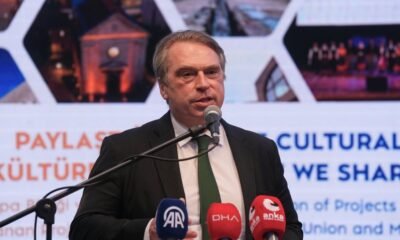
 Politics3 days ago
Politics3 days agoEU ambassador says ‘shameful’ to demand visas from Turks
-
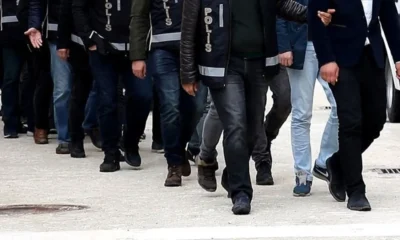
 Daily Agenda3 days ago
Daily Agenda3 days agoLast minute: FETÖ Operation in TSK in 41 provinces: 174 of the muvazzaf, 176 soldiers detention decision
-
Daily Agenda3 days ago
It is not that disappointment
-
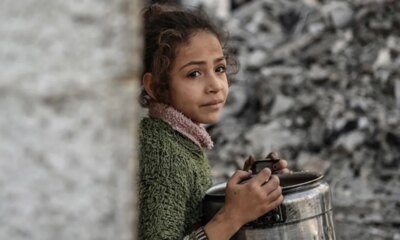
 Daily Agenda3 days ago
Daily Agenda3 days agoUN: Children in Gaza may die of thirst
-
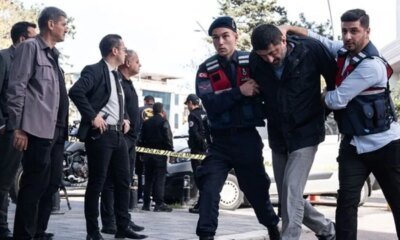
 Daily Agenda2 days ago
Daily Agenda2 days agoNEW BY NEWSHIP GOK INVESTIGATION NEW DEVELOPMENT! 100 years imprisonment request
-
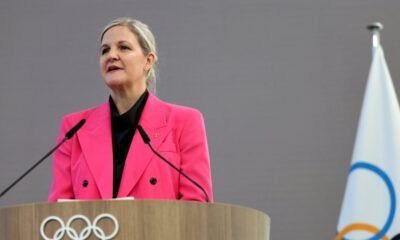
 Sports3 days ago
Sports3 days agoKirsty Coventry inaugurated as new IOC president for 8-year term
-
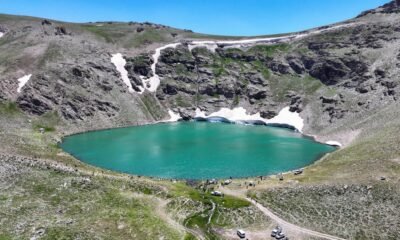
 Lifestyle2 days ago
Lifestyle2 days agoVan’s Çalyan glacier lake draws nature fans to eastern Türkiye
-
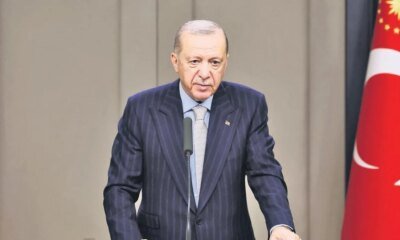
 Daily Agenda2 days ago
Daily Agenda2 days agoOur region cannot lift the burden of war – last minute news




